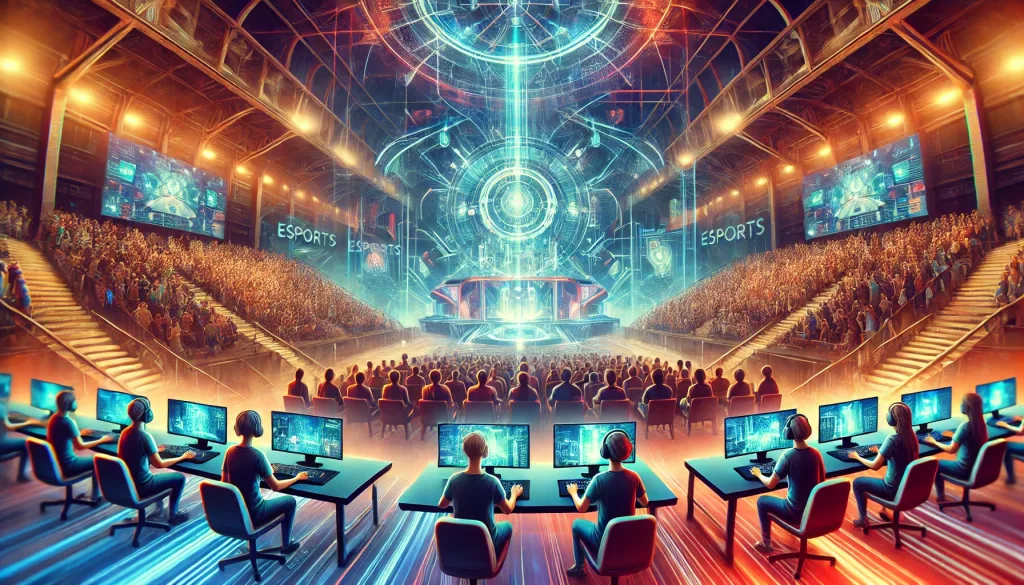
Electronic Sports (eSports): The Rise in Popularity and Economic Impact on the Entertainment Industry
Electronic sports, or eSports, have become a significant part of the entertainment industry, showing unprecedented growth worldwide. The popularity of eSports competitions has risen due to technological integration, cultural shifts, and the engagement of various age groups in new competitive formats. This article explores how eSports is transforming the entertainment industry and the economic impact it has on today’s world.
The Emergence and Development of Electronic Sports
eSports began as informal competitions among gaming enthusiasts but quickly evolved into a professional segment. Since the 2000s, eSports has captured the attention of millions of viewers globally, with competitions organized on both national and international levels. The recognition of eSports as an official competitive field and even discussions of its inclusion in the Olympics highlight its acceptance and growing support.
The evolution of eSports has been fueled by an enthusiastic community, streaming platforms, and advanced gaming technology. Originally, competitions were limited to small, in-person events, but with platforms like Twitch and YouTube, eSports tournaments now attract global audiences. These platforms enable fans to engage, watch, and support their favorite teams and players in real time from anywhere in the world.
Moreover, the variety of games in eSports—ranging from real-time strategy and multiplayer online battle arenas (MOBAs) to first-person shooters—offers something for everyone, broadening its appeal. The potential for individuals to become professional players, commentators, and analysts has opened up new career paths, contributing to eSports’ allure and sustained growth.
Key Drivers of eSports Popularity
The accessibility of gaming platforms, the rapid advancement of technology, and the expansion of online streaming options have all contributed to the popularity of eSports. Viewers can watch tournaments on platforms like Twitch and YouTube, which allows them to engage with the eSports community from any corner of the world. These interactive platforms also enable fans to communicate with players, providing a unique level of connectivity within the community.
Another significant factor is the highly competitive and social nature of eSports. The sense of community built around games, tournaments, and teams adds to its appeal, with fans supporting their favorite players and teams with a fervor similar to traditional sports. Many eSports events also have live audiences, adding to the excitement and giving fans an immersive experience.
The Economic Impact of eSports on the Entertainment Industry
eSports has a substantial economic impact, drawing millions of dollars from sponsors, advertisers, and fans alike. Major brands are investing in tournament organization, teams, and even dedicated eSports arenas to support this growing industry. This economic boost creates numerous job opportunities across technical, marketing, and managerial positions, contributing significantly to the global entertainment sector.
The economic structure of eSports revolves around multiple revenue streams, including sponsorship deals, broadcasting rights, advertising, and merchandise sales. Brands such as Coca-Cola, Red Bull, and Intel have made substantial investments in eSports, recognizing its potential to reach young, tech-savvy audiences. These partnerships not only boost brand visibility but also help fund tournaments and prize pools, increasing eSports’ legitimacy as a competitive field.
Another notable economic impact is the tourism generated by eSports events. Major tournaments held in stadiums across the globe attract thousands of attendees, filling hotels, restaurants, and other local businesses. The economic benefits are particularly notable in cities that host major events, making eSports a valuable sector for local and national economies.
The Monetization Model in eSports
The eSports monetization model includes the sale of broadcasting rights, sponsorship agreements, advertising, and ticket sales for major events. Many tournaments also create opportunities for fans to purchase merchandise for their favorite teams or players, further contributing to the industry’s growth. Some of the most popular tournaments, such as The International and League of Legends World Championship, offer multi-million-dollar prize pools funded by both ticket sales and crowdfunding, underscoring the financial strength of the eSports sector.
In addition to these traditional revenue streams, eSports has also embraced digital currency models through in-game purchases and virtual items, which players can buy to support their teams or enhance their gaming experience. These innovative approaches to monetization demonstrate eSports’ ability to adapt and thrive in a digital economy, creating a lucrative environment for investors and stakeholders.

Socio-Cultural Impact and the Future of eSports
eSports not only impacts the economy but also changes how young generations view sports and recreation. It provides a platform for socialization, creativity, and self-expression, attracting new players and viewers. As technology continues to advance, we can expect even more integration of virtual reality (VR) and augmented reality (AR) in eSports, contributing to a more interactive experience.
eSports has broken down geographic, cultural, and social barriers, creating a global community where players and fans interact regardless of background. This inclusivity is particularly appealing to younger generations who view digital interactions as a norm. Furthermore, the professional nature of eSports helps dismantle stereotypes about gaming, promoting it as a legitimate career path and an area of skill development.
The future of eSports is promising, with developments in technology such as 5G networks and improved streaming capabilities. This will likely lead to more immersive experiences and potentially even new game genres. As VR and AR become more mainstream, the eSports landscape could change dramatically, blending physical and virtual worlds in ways that could redefine what competitive gaming looks like.
Impact on Younger Generations
The support for eSports among young people highlights changes in how leisure time is spent. The accessibility of competitions and the potential for a professional career in eSports create new standards and roles in society. This is only the beginning of future changes, where eSports may become a vital component of education and personal development for younger generations.
By actively participating in eSports, younger generations develop skills such as teamwork, strategic thinking, and decision-making under pressure. Many schools and universities have recognized these benefits, incorporating eSports into their extracurricular programs. As eSports gains more traction, it’s likely we’ll see an increased emphasis on its educational value, promoting not only recreational engagement but also skill development and career potential.
